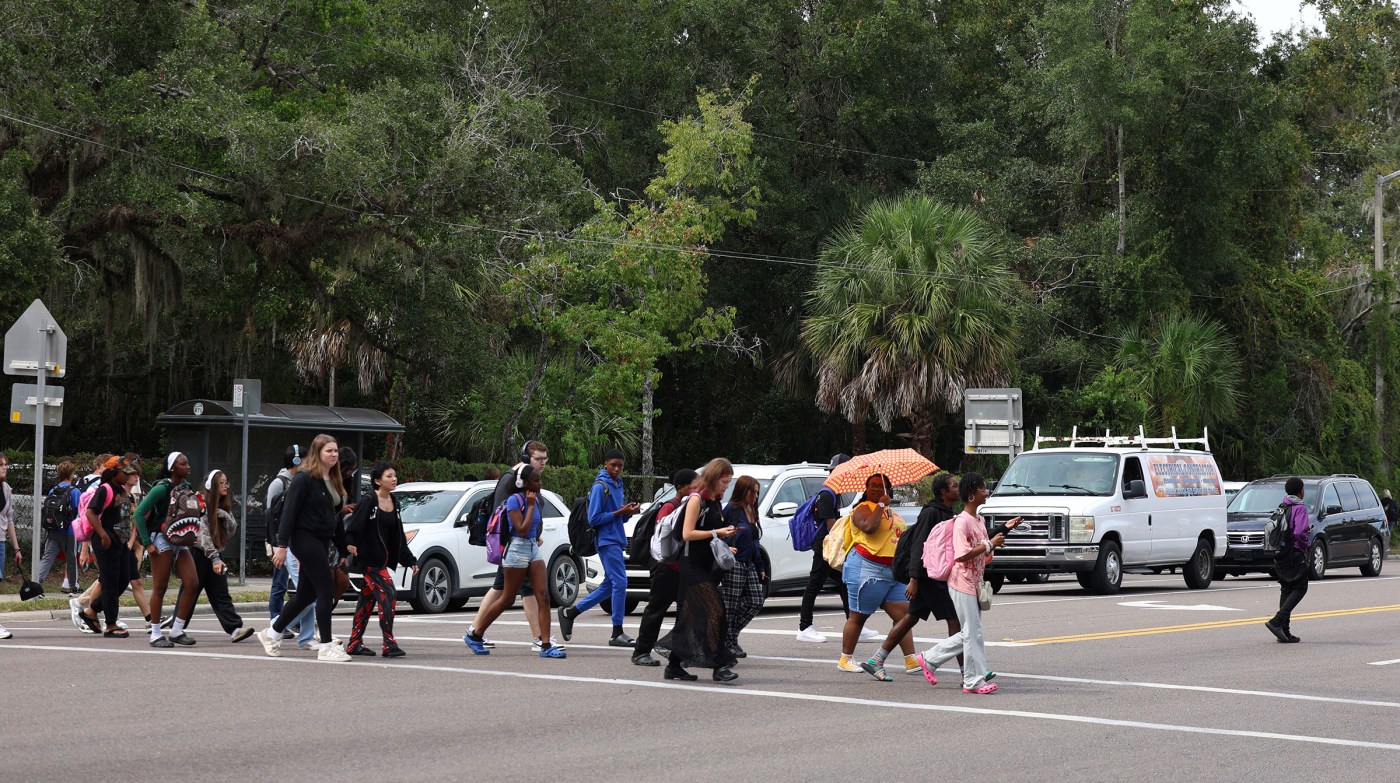World
Fear of Immigration Enforcement Drives Families Out of Florida Schools

In Florida, an alarming trend is emerging as families withdraw their children from public schools due to fears of immigration enforcement. This year, significant enrollment drops in major districts have been attributed to the anxiety surrounding potential arrests near schools. Alex Rodriguez Silva, a natural-born American citizen, is among those who made the tough decision to leave Florida after experiencing this pervasive fear.
Silva, along with his fiancée Ana, moved from Hialeah to Denver, citing the need for a safer environment for their children. Ana, a Brazilian national who overstayed her tourist visa, has faced the constant threat of being detained by Immigration and Customs Enforcement (ICE). “We couldn’t take it anymore, the constant fear that one of us could be disappeared by ICE,” Silva stated. The couple’s experience reflects a growing concern among immigrant families in Florida, prompting many to reconsider their educational options.
Enrollment Declines in Major Districts
Education officials have reported unexpected enrollment declines across several districts in Florida. In Orange County, the school district faced a decrease of approximately 6,600 students this year, much higher than the 3,000 predicted departures to charter schools. Stephanie Vanos, a member of the school board, indicated that many of these students came from immigrant families. “Allowing immigration enforcement activities near schools sets up a culture of fear among immigrant families,” she explained.
Similar patterns emerged in Broward County, which reported a decline of more than 11,300 students. According to school board member Sarah Leonardi, the decrease seems to be concentrated within immigrant communities. Although there have been no confirmed immigration raids at public schools, the threat of enforcement has created a chilling effect on attendance. “We’ve seen it anecdotally, in pockets of communities and certain schools,” Leonardi remarked.
Enrollment in Miami-Dade County also dropped by more than 13,000 students, surpassing the district’s initial estimate of 5,000. With a student population of roughly 328,000, the decline has raised concerns among educators. Superintendent Jose Dotres noted that the drop could not solely be attributed to immigration enforcement but cited a broader trend of families seeking alternative educational options.
The Impact of Policy Changes
The recent changes in immigration policy have intensified fears among immigrant families. Since January, ICE has been allowed to operate on school campuses, reversing a previous policy that limited enforcement in “sensitive areas” such as schools and churches. This shift has contributed to increased absenteeism, particularly in schools with large immigrant populations. “It is extremely disturbing that these students aren’t coming to our schools,” Vanos said, emphasizing the emotional toll on students.
The broader implications of these enforcement policies are evident in the stories of families like Silva’s. Silva’s child began showing signs of distress, refusing to leave the car during school drop-off due to fears surrounding Ana’s immigration status. “All she wanted was to be involved and spend those precious moments with our kids,” Silva shared, highlighting the emotional turmoil faced by families caught in the immigration system.
Andrew Spar, president of the Florida Education Association, underscored the detrimental effects of deportations on the school environment. “Schools need to be safe spaces for students and families,” he stated. The impact extends beyond the campus, as the fear of deportation can disrupt the learning experience for both students and teachers.
The situation remains fluid as educators and policymakers grapple with the consequences of current immigration policies. While some officials argue that the decline in enrollment cannot be wholly attributed to fear of enforcement, the testimonies of families reveal a deeper issue at play. The ongoing anxiety surrounding immigration status continues to shape the educational landscape in Florida, leaving many families feeling vulnerable and uncertain about their future.
As the academic year progresses, the long-term effects of these trends will likely become clearer. For families like Silva’s, the need for safety and stability in their lives remains a top priority, even if it means leaving behind the only home they have known.
This article is part of an ongoing collaboration organized by Carnegie-Knight schools of journalism to provide in-depth coverage of immigration issues. Further reporting can be found through Fresh Take Florida, a news service of the University of Florida College of Journalism and Communications.
-

 Science3 weeks ago
Science3 weeks agoInventor Achieves Breakthrough with 2 Billion FPS Laser Video
-

 Health4 weeks ago
Health4 weeks agoCommunity Unites for 7th Annual Into the Light Walk for Mental Health
-

 Top Stories4 weeks ago
Top Stories4 weeks agoCharlie Sheen’s New Romance: ‘Glowing’ with Younger Partner
-

 Entertainment4 weeks ago
Entertainment4 weeks agoDua Lipa Aces GCSE Spanish, Sparks Super Bowl Buzz with Fans
-

 Business4 weeks ago
Business4 weeks agoTyler Technologies Set to Reveal Q3 Earnings on October 22
-

 Entertainment4 weeks ago
Entertainment4 weeks agoMother Fights to Reunite with Children After Kidnapping in New Drama
-

 Health4 weeks ago
Health4 weeks agoCurium Group, PeptiDream, and PDRadiopharma Launch Key Cancer Trial
-

 World4 weeks ago
World4 weeks agoR&B Icon D’Angelo Dies at 51, Leaving Lasting Legacy
-

 Entertainment4 weeks ago
Entertainment4 weeks agoRed Sox’s Bregman to Become Free Agent; Tigers Commit to Skubal
-

 Health4 weeks ago
Health4 weeks agoNorth Carolina’s Biotech Boom: Billions in New Investments
-

 Science4 weeks ago
Science4 weeks agoNorth Carolina’s Biotech Boom: Billions Invested in Manufacturing
-

 Top Stories4 weeks ago
Top Stories4 weeks agoFormer Mozilla CMO Launches AI-Driven Cannabis Cocktail Brand Fast









